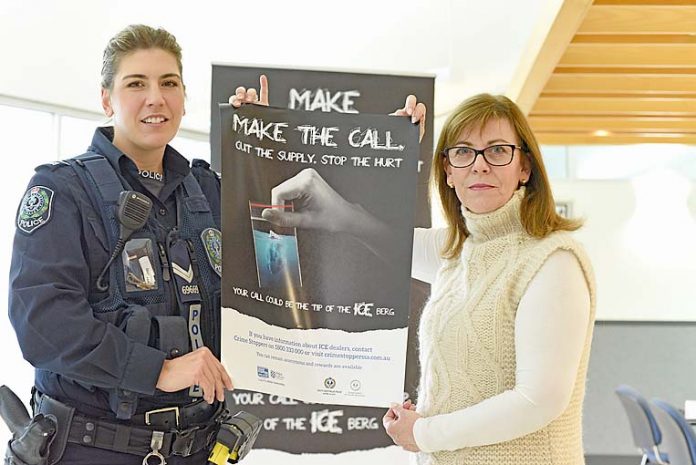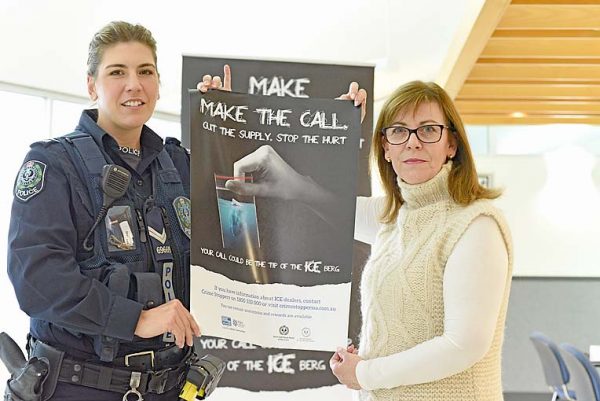

MOUNT Gambier and district residents has been urged to be on high alert for suspicious activity in their neighbourhoods as authorities step up efforts to snare regional drug traffickers.
Suspicious packages in the mail or through couriers along with unusual activity in residential streets are among ways to spot a drug dealer or a clandestine drug laboratory.
The call comes amid the launch of a campaign calling on people to call Crime Stoppers SA to report suspicious behaviour.
Authorities are particularly calling on people to report any activity or suspicions linked to the crystal methamphetamine (ice) scourge in the community.
While regional police have had some success in prosecuting a number of drug traffickers, they warned criminals continued to operate in quiet residential streets across the region.
Speaking at the regional launch yesterday of the “Make the Call. Cut the Supply. Stop the Hurt Campaign”, Limestone Coast Police officer in charge Superintendent Grant Moyle revealed people were every week contacting Crime Stoppers about illegal drug activity in the region.
“The majority of calls relating to the South East is drug information,” Supt Moyle told The Border Watch.
He said this information was vital in helping police gather enough evidence to obtain a search warrant.
“One phone call on its own may not provide all the necessary detail that we want, but we may get a number of calls regarding the one house.”
Supt Moyle said drug traffickers were moving drugs around the city and into the region through a variety of avenues.
“We have intercepted drugs in the post, it is just one of the many innovative ways traffickers use,” he said.
Supt Moyle also revealed police were focusing on drug transit routes.
“We have had a highway patrol and traffic support branch recently down here doing a couple of locations, include the road out to the Mount Gambier Prison,” he said.
While a significant amount of ice was coming into Australia from China, he said the drug was also being manufactured in the region.
The police official also said the number of drivers testing positive on the roads for methamphetamine was alarmingly high.
Crime Stoppers SA chair Sharon Hanlon urged people to call the telephone line or visit the website because no detail was “too small or insignificant”.
“Every detail is important so police can build a picture,” Ms Hanlon said at the Mount Gambier Police Station yesterday.
She said police raids stemming from Crime Stoppers tip-offs were also netting large volumes of cash, drug making chemicals and firearms.
“These criminals are nasty people – that is the lifestyle they are living,” Ms Hanlon warned.
She said the Crime Stoppers campaign stemmed from the state ice taskforce and aimed to “cut the supply” of illicit drugs.
“We are not particularly interested in the end users … but we are focusing on the ice traffickers. Ice is the most addictive and most concentrated form of methamphetamine.
“It really is a scourge on the community because for that reason. We do know there are people who are fronting up on Monday to their regular job and are still able to function, but that doesn’t last forever.
“The impact of ice is felt across businesses and workforces.”
Alarmingly, she revealed statistics showed nearly half of the meth-related deaths were in rural and regional areas.
Statistics revealed there were 1649 meth-related deaths across Australia between 2009 and 2015.
The most common cause of death was found to be an overdose, followed by heart disease, suicide and road vehicle deaths.
Ms Hanlon said Crime Stoppers strictly guarded the “anonymity” of people contacting Crime Stoppers, which meant people did not have to fear retaliation from drug dealers.
She said this meant people could provide information without approaching or calling police.
Since the campaign launched in mid-February, there has been a “staggering” 247pc increase in the number of amphetamine-related calls from people wanting to help stop the supply of ice across the state.
“Because regional communities are close-knit, people tend to know who is selling drugs,” Ms Hanlon said.
She said information provided by the community had shut down three clandestine drug laboratories and seen the arrest of 10 people for a number of significant amphetamine-related offences, including trafficking in large commercial quantities of a controlled drug.
She also warned people were increasingly using online marketplaces, social media and encrypted phone apps to buy and sell illicit drugs.







